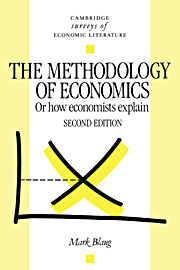Book contents
- Frontmatter
- Contents
- Preface
- Preface to first edition
- Part I What you always wanted to know about the philosophy of science but were afraid to ask
- Part II The history of economic methodology
- 3 The verificationists, a largely nineteenth-century story
- 4 The falsificationists, a wholly twentieth-century story
- 5 The distinction between positive and normative economics
- Part III A methodological appraisal of the neoclassical research program
- Part IV What have we now learned about economics?
- Glossary
- Suggestions for further reading
- Bibliography
- Name index
- Subject index
3 - The verificationists, a largely nineteenth-century story
Published online by Cambridge University Press: 10 December 2009
- Frontmatter
- Contents
- Preface
- Preface to first edition
- Part I What you always wanted to know about the philosophy of science but were afraid to ask
- Part II The history of economic methodology
- 3 The verificationists, a largely nineteenth-century story
- 4 The falsificationists, a wholly twentieth-century story
- 5 The distinction between positive and normative economics
- Part III A methodological appraisal of the neoclassical research program
- Part IV What have we now learned about economics?
- Glossary
- Suggestions for further reading
- Bibliography
- Name index
- Subject index
Summary
The prehistory of economic methodology
A subtle but significant difference separates the methodological writings of nineteenth-century economists from those of twentieth-century ones, or rather from those of modern economists in the last forty years or so. The great British nineteenth-century economic methodologists focused attention on the premises of economic theory and continually warned their readers that the verification of economic predictions was at best a hazardous enterprise. The premises were said to be derived from introspection or the casual observation of one's neighbors and in that sense constituted a priori truths, known, so to speak, in advance of experience; a purely deductive process led from premises to implications, but implications were true a posteriori only in the absence of disturbing causes. Hence, the purpose of verifying implications was to determine the applicability of economic reasoning and not really to assess its validity. The ingenuity of these nineteenth-century writers knew no bounds when it came to giving reasons for ignoring apparent refutations of an economic prediction, but no grounds, empirical or otherwise, were ever stated in terms of which one might reject a particular economic theory. In short, the great British nineteenth-century methodologists of economics were verificationists, not falsificationists, and they preached a defensive methodology designed to make the young science secure against any and all attacks.
- Type
- Chapter
- Information
- The Methodology of EconomicsOr, How Economists Explain, pp. 51 - 82Publisher: Cambridge University PressPrint publication year: 1992



